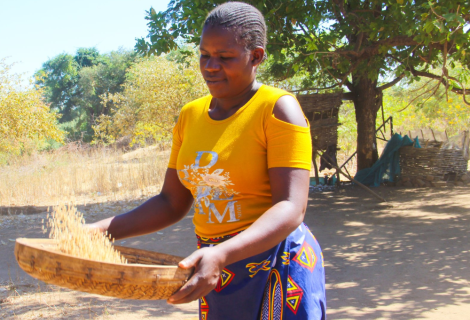SEEDS OF RESILIENCE: ‘SMALL’ SESAME BRINGS ‘BIG’ SMILES TO MBIRE FARMERS

In the Mbire district, farmers supported by ActionAid Zimbabwe (AAZ) and its partner, Fambidzanai Permaculture Centre (FPC) have shown remarkable resilience despite extreme drought conditions caused by El Niño. This season, while many farmers nationwide faced complete crop failures, those who focused on small grains, especially sesame, managed to adapt and thrive. On average, these farmers achieved a harvest of 56 kg of sesame each, totaling an impressive 17,600 kg, even though this was less than what they harvested in the previous season. The success of these farmers demonstrates their increased ability to handle difficult Out of all the crops I planted, sesame was the only one that survived the harsh conditions and adapt to changing climates. They have successfully implemented food security solutions, changed public perceptions of agroecological practices, and expanded livelihood options to support their families through the year. After the harvest, many farmers exchanged their sesame for livestock like goats, further enhancing their resilience. For example, Mr. Brian Kamunda, a young farmer from Ward 9, received just 2 kg of sesame seeds from AAZ and FPC and planted them on his half-acre plot. He harvested 675 kg, or fifteen bags of sesame, which he credited to early planting and the training he received. “Out of all the crops I planted, sesame was the only one that survived the harsh conditions,” Brian shared. This success has brought financial relief and security to his family. Similarly, Thomas Kasara, another youth farmer, also harvested over 600 kg of sesame, leading to improved livelihoods for him and his family. In addition to sesame, AAZ and FPC also introduced sorghum cultivation. Faith Chigombe, a smallholder farmer from Karai in Ward 8, cultivated sorghum even in challenging weather. She successfully harvested over 800 kg. Many farmers in her area struggled due to low rainfall, but her harvest provided food for her family and boosted her financial stability. Mr. Majaira, the Development Coordinator for Ward 8, noted, “For those who planted early, sorghum did very well, bringing income and healthy meals.” Despite the harsh conditions this farming season, AAZ and FPC’s interventions have led to significant changes. While many of the over 300 youths who received seeds struggled, those who engaged with drought-resistant crops like sesame and sorghum have seen hope and opportunity. Before their involvement, sesame was not widely cultivated; only 43% of beneficiaries engaged in its production. Now, 61% are participating in the sesame value chain, learning sustainable farming practices, and increasing their harvests for both food security and market sales